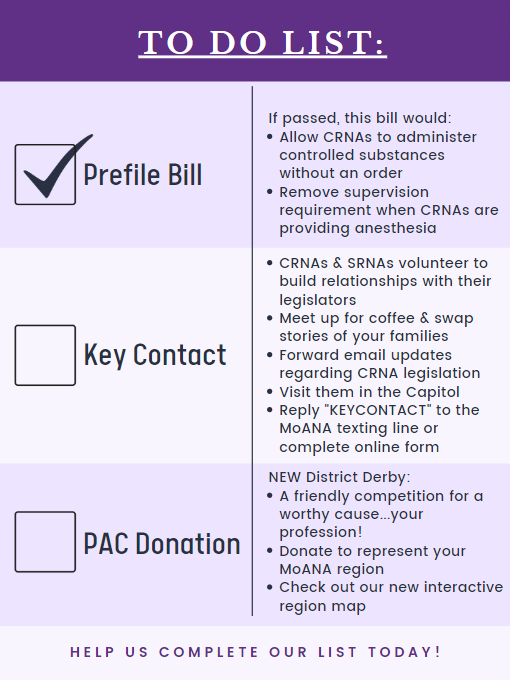CRNA Bill
Pre-Filed!
HB 329 & SB 27 Legislative Session 2023

Key Contact Form:
MoANA District Derby
Click Here
Countdown to Legislative Session:
Days Hours Minutes Seconds
Common Questions & Answers for CRNAs
What is the current Missouri law?
Current statutes require CRNAs be supervised by a physician, dentist, or podiatrist. CRNAs must also have hospital guidelines in place or obtain an order prior to every controlled substance administration. The pre-filed bill includes language to remove both of these requirements.
Why do I need authorization before administering a controlled substance in my anesthetic?
Any provider in Missouri that handles controlled substances is regulated by the Bureau of Narcotics and Dangerous Drugs (BNDD). In our current statutes, there is some unclear language that the BNDD has interpreted to mean that CRNAs are excluded from administering controlled substances without an order. As a result, hospitals have to implement and update guidelines for CRNAs specifying parameters for controlled substances administration, or the CRNA must ask for an order from their supervisor (physician, dentist, or podiatrist) prior to administration of a controlled substance.
Would this bill require me to register for a DEA or BNDD number?
All providers, businesses, or entities in Missouri who handle controlled substances are required to have a certificate of controlled substances through the BNDD. Because this bill would allow CRNAs to administer controlled substances independently, the CRNA would also be required to register through the BNDD. This would involve completing a short written or online application and a $30 annual fee paid to the BNDD. The CRNA may then choose to work under their institution’s DEA number (common in MO), or obtain their own federal DEA. If the CRNA chooses to apply for a federal DEA number, they will complete an online application and pay the three-year registration fee of $888. If the CRNA does not wish to apply for a BNDD or DEA number, they may continue to request an order with every administration of a controlled substance.
Why go for supervision removal?
Missouri’s law for supervision has been in place for nearly 20 years and is inconsistent with Centers for Medicare & Medicaid Services (CMS) rules. Missouri is now bordered on three sides by states that have removed this requirement. In addition, Missouri was unable to benefit from the federal emergency waivers during the pandemic due to state laws.
This past summer a poll was sent out to MoANA members and the results were heavily weighted towards wanting supervision removal and correction of BNDD interpretation; the board is responding to the results of that survey.
I work in a solo-CRNA practice or with a group of CRNAs. What would this change for me?
This bill would allow CRNAs to practice independently. This would mean the surgeon, dentist, or podiatrist would not have to sign off on the anesthesia care provided. In addition, CRNAs would not have to request an order prior to every administration of a controlled substance.
I have a pain practice. How will this affect me?
There is currently a limited number of facilities that provide treatment for chronic pain procedures in rural areas. Missouri CRNAs practicing pain have to work within a collaborative practice agreement with a physician. This bill would remove that requirement. Instead, the Missouri Board of Nursing states that advanced practice providers are able to practice within their training and education.
I have a ketamine clinic or med spa practice. How will this affect me?
This bill would remove the requirement for supervision for anesthesia procedures. At this time, anesthesia procedures are not clearly defined to include or exclude ketamine or med spa practices. CRNAs will continue to have the option to work within a collaborative practice agreement under current statute requirements.
My hospital has physician anesthesiologists. What will this change for them?
The answer depends on your hospital. In some hospitals, nothing will change and CRNAs can continue to practice in care-team models. This bill is meant to remove burdensome regulatory requirements; it is not meant to undermine physician anesthesiologists. We value their anesthesia practice as we value ours. And both of us are needed to provide services to Missourians. Any change would again depend on your hospital. Hospitals will be given the option to either adopt the new rules or keep the current care-team model. Some institutions will decide to keep everything the same; others may opt to make small changes such as permitting the CRNA to order labs, request blood administration, or enter postoperative orders. We encourage you to stay in communication with your hospital administrators and relay any feedback. Further resources will be provided to all hospitals and anesthesia departments to let them know their options.
What will this change for surgeons?
If passed, surgeons will no longer be required to sign off on your anesthesia record. Surgeons will also not have to give permission to administer a controlled substance. Though case law supports that surgeons are no more liable working with a CRNA than with a physician anesthesiologist, updating the state law will remove any confusion regarding who is responsible for the anesthetic.
I like my practice the way it is. I do not want supervision removed.
We are happy to hear you enjoy your current practice. If MoANA’s proposed legislation passes it does not mean a CRNA has to change their practice. It will, however, allow flexibility for each hospital to determine how they would like to structure their anesthesia department.
What about opt-out?
A criteria of opt-out is that state statutes align with CMS standards; current CMS standards do not require CRNA supervision. So before Missouri can opt-out, supervision must be removed from MO state statutes. After this step, then the Governor may sign an opt-out letter.